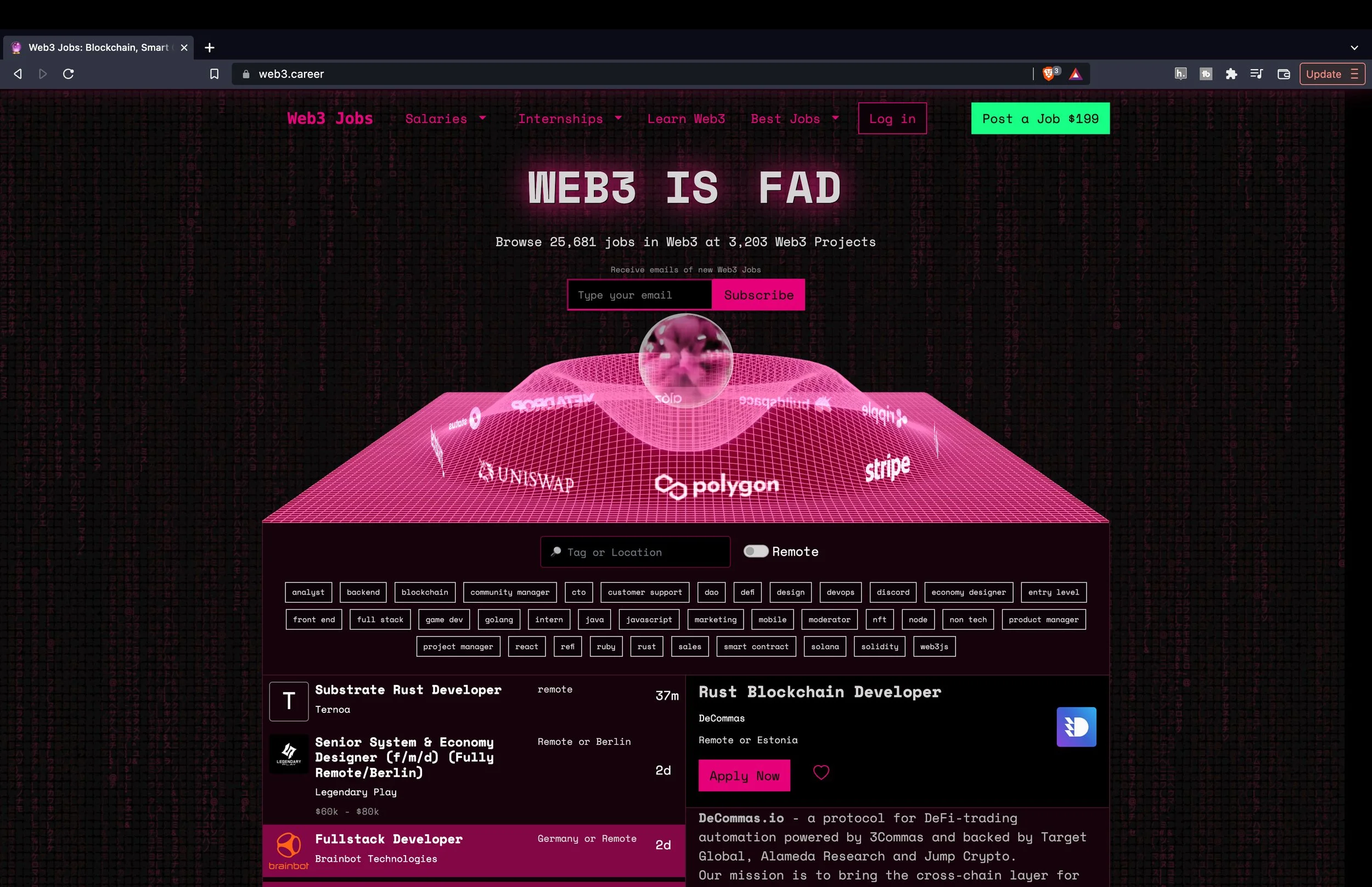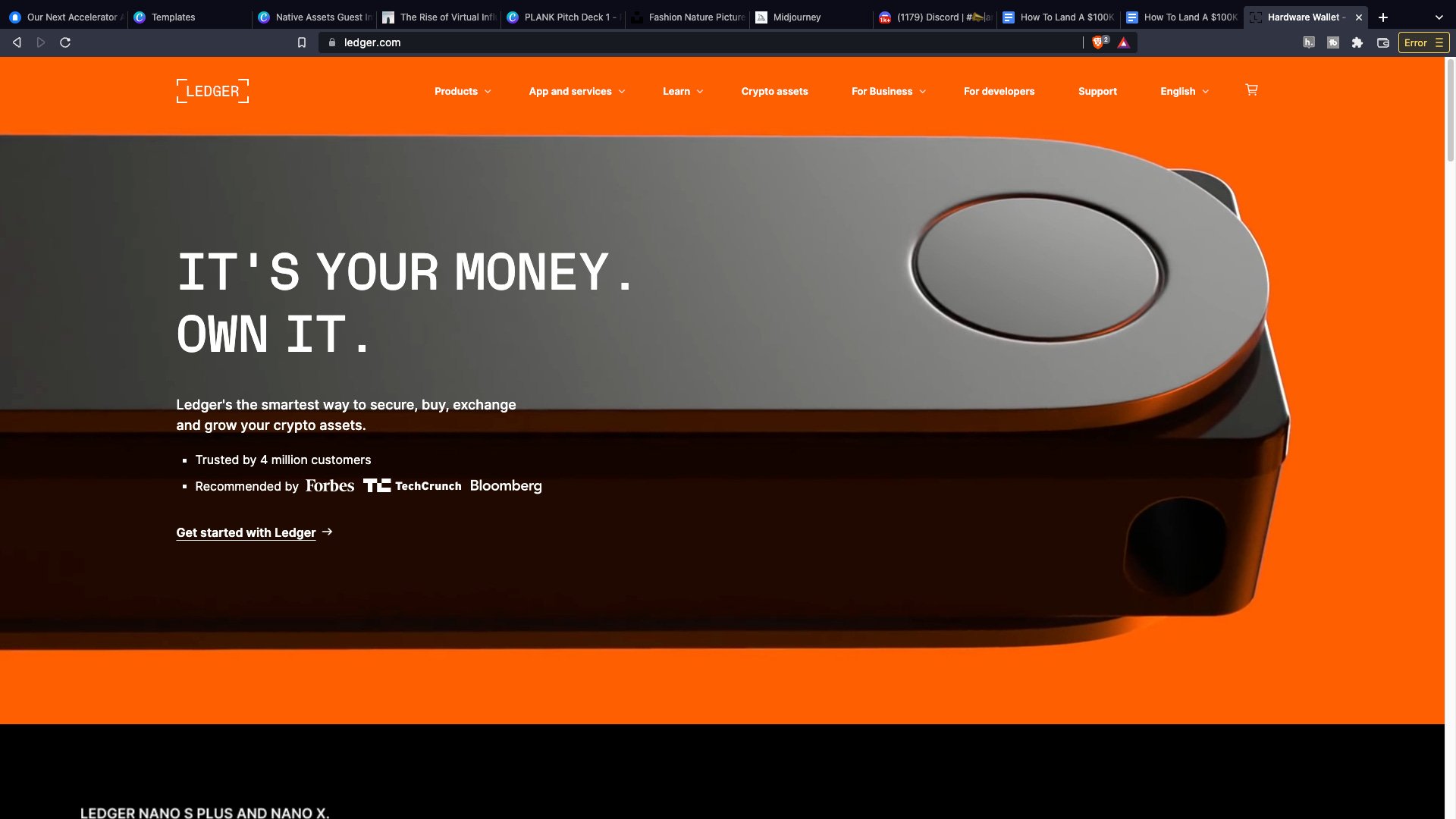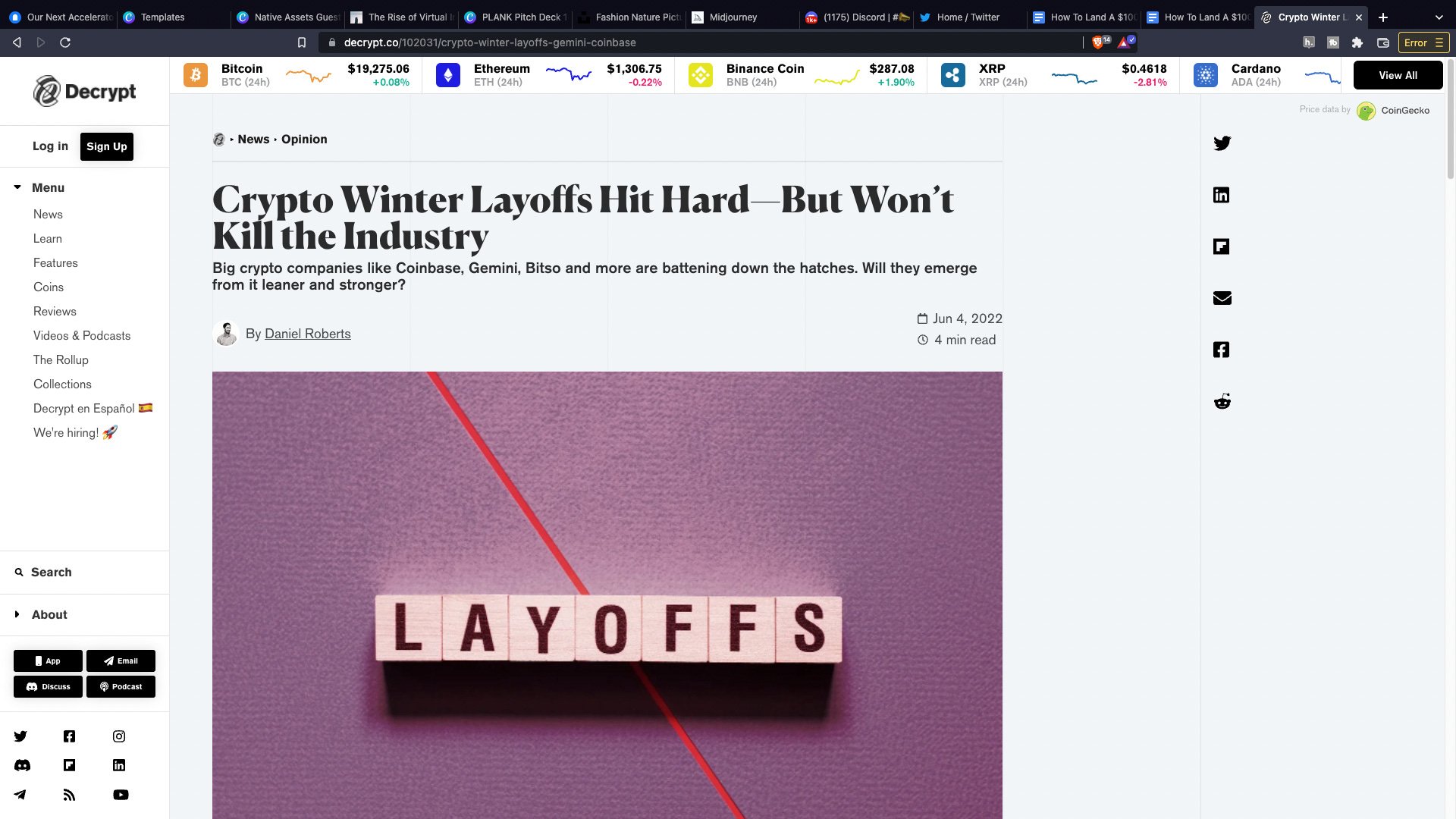How To Land A $127K+ Job In Web3
Sae’Von Springer - Founder & Managing Partner, Native Assets
Want to find a six figure paying, career advancing, curiosity feeding job in the Web3 and crypto sector? Well you’re in luck, because I’m about to teach you exactly what I did to find my current six figure role in the industry.
This article was originally published on the Native Assets Substack on October 3, 2022
Sure, I could write a quick 2-3 tweet thread pointing you to some web3 & crypto specific job boards, but that wouldn’t do a damn thing for you.
Instead, I’ve typed this tome to cover everything you need to know, consider & do to land your dream web3 job with zero previous experience at a major tech company before, without an engineering degree, without any industry connections, & most importantly - without compromising on your needs.
So, I suggest you read (or watch) this in its entirety. It just might be worth a few hundred thousand dollars! 🤑
The 6 Figure Blueprint
In a nutshell, the process for finding your dream six figure job, be it in Web3 or otherwise, is the following:
Get clear on your why
Figure out which sector of the industry you want to work in
Figure out your dream company & role
Search for job listings that match your criteria
Apply
Interview
Negotiate
Sign
We’re gonna cover all of this & then some, but I know you're eager to get started, so let's begin with where to find the best opportunities.
The Best Web3 Job Boards
There’s a few Web3/Crypto focused job boards, but my favorite hands down is Web.Career. It’s well organized, updated several times a day, has excellent options to filter your search. Plus, it looks dope.
Some other options include CryptocurrencyJobs.Co as a close second, followed by
Of course there are other job boards out there, & even some talent firms like Proof of Talent that will represent you in the job search process, but you’re covered with these.
Choosing The Right Web3 Company
Now that we’ve covered where to find jobs, let’s talk about how to find the right web3 company.
For starters, try to narrow down which sector of crypto + web3 you want to work in. In general, most orgs are focused around either:
NFTs
DeFi
DAOs
Exchanges
Fiat/Crypto On/Off Ramps
Infrastructure Tools
Gaming
Just like any other industry, there’s a ton of variety between different Web3 & crypto organizations even if they’re within the same category. To best gauge the potential fit or compatibility of a company you need to assess three areas:
Mission/Vision
Culture
Compensation
Mission + Vision
What’s the core thesis driving the company forward? What's the big solution to the big problem? For example Ledger is bringing security to digital assets, Coinbase wants to be the easiest place to trade crypto, & OpenSea is determined to remain the go-to marketplace for NFTs. These are all noble aims, but do you actually care? You may love Bitcoin & think Ledger is amazing, but abhor the idea of NFTs. You may be a huge culture aficionado, but think Bitcoin is overhyped.
If you don't align with a company’s mission & vision, I'd suggest you look for a different one. If you're a mercenary hunting down the biggest check, more power to you. Just keep in mind the cumulative impact of spending 40+ hours a week working on something you don't give a damn about. Patience & diligence are key to securing the bag while doing work you enjoy.
Culture
From Defi Degens & Yield Farmers to mint flippers & metaverse maxis - The culture of your future employer is going to impact your experience as a working professional in Web3 & Crypto more than ANYTHING else & YES, that includes compensation (which we’ll get to soon). That’s not to say you’ll be over the moon about every little detail of the culture, but certain nuances are pretty impactful.
Vibe
Once you start looking into a company, the overall vibe check begins. What do you notice on the surface & what can you gauge beyond that? Do they seem more creative or analytical? Profit driven or impact centric? Competitive or collaborative? From the design & branding to the copy & comms, everything about the company should provide you insight about the energy of the organization. Some of this will be intentional, some of it won’t, but take it all in, & see if it feels right. This isn’t a commitment to join the org, but rather a temp check on proceeding forward to learn more.
Environment
Nature v nature holds true within companies too, the biggest environmental factor being whether the org is fully remote, fully onsite or hybrid. If the job is remote, consider the dominant time zone for most of the team & whoever else you’d be working with regularly since this will inform the hours you’re expected to work. If you’re based in Asia but the rest of your team is New York, that may be difficult to manage. Are there any language barriers? If you’re onsite - will you have your own office or share a space?
Team
Is the team scrappy & close knit or are there hundreds of folks spread all across the org? Is it 90% men? Is it 90% women? Is the organizational structure one that encourages & facilitates growth or does it seem more bureaucratic?
Job Security
Most start ups, hell, most companies fail in the first few years - this is even more true for crypto & web3 orgs. Risk is non negotiable. BUT, there’s likely more security in joining a venture backed company than one that’s bootstrapped by the founding team. What about growth phase vs pre product? Working for an incumbent leader like OpenSea will be quite different from working at a challenger marketplace like Gem.xyz.
Once you’ve vetted a company on the above merits, you’re in a good position to figure out where they sit on the Web2-Web3 spectrum. A truly crypto native company is likely to pay you in crypto and hire pseudonymous folks who use their PFP during work meetings. Other companies may be more “Web2.5”, solely focused on building out Web3 products but operating like a traditional company with official titles, pay scales, org charts, etc. You may also find that the company is really Web2 by nature & simply exploring a way to integrate Web3 functionality.
Ultimately all of these questions are to help gauge if the company can survive a bear market. If not, why join a sinking ship?
Compensation
Jobs in crypto & web3 tend to pay more than their non-crypto counterparts, & for good reason. First off - the demand for quality talent far outpaces the supply. Secondly - most companies are remote, meaning a larger pool of talent to source from & a larger pool of organizations to join. This dynamic usually raises the standards and expectations on both sides.
Some companies are even compensating their team members in a location-agnostic way. Optimism PBC, the company behind one of the leading L2s, explicitly notes that it will pay all employees a salary based on San Francisco cost of living - no matter if you live in SF or in Bali. Orgs that can’t afford to be so generous with their salaries often try to close the gap by offering equity packages via stock options or token allocations, wellness programs, equipment stipends, or generous PTO policies. To find more details about a company’s benefits & perks check their site or their job board.
I’ve also included a link to an amazing spreadsheet with hundreds of real world comp packages from Web3 & crypto professionals that’ll tell you everything from roles & salary to equity & what stage the company is in.
If you want even more data, sites like Levls.fyi & BuiltIn are also excellent resources for tech salaries, but they aren’t crypto specific, so find a comparable role & add a 5-20% premium to get a range of an equivalent Web3 rate. Keep in mind that this is a starting point & can often be adjusted once you’ve entered negotiations.
How To Find The Perfect Web3 Role For You
Skills
I’ve seen plenty of folks accept a job just because it pays well or for the impressive optics it provides on their resume - but patience & clarity as key to finding the right role. Your pre-existing skills should help you stand out as a candidate & provide leverage in the negotiation phase. On the flip side, you also have a chance to get paid to up-skill, I suggest you find a role that ticks both boxes if possible.
Titles
Be it importance, pay scale or power, titles are often used as a proxy of status. The more mature & scaled the org, the more this is true. Many teams in this space will be too small to be concerned with formal org charts though. Regardless, titles in isolation mean nothing, so never make assumptions about a role from the title alone.
Scope
What’s more important than a title is the scope of the position.
What responsibilities, autonomy, decision-making power, & compensation is requisite of the role?
Do you consistently work alongside the founders + executive team or are you only interacting with entry level team members?
How does your work influence the company’s balance sheet?
Do you manage a budget?
What sort of choices can you make without prior approval?
Should you ever find this scope out of whack with the position's formal title, propose a new one & see if the hiring manager + HR are willing to adjust. You’d be surprised how often this happens, particularly if you’re a critical hire.
Intangibles
Finally, think about the indirect aspects of your role. Certain positions allow greater networking opportunities, some are optimal for building a creative portfolio, others are excellent for honing technical skills. Let your intuition & career goals inform how you value the intangibles.
Discovering The “Why” Driving Your Web3 Job Search
Finding your dream job starts with establishing a deep understanding of what’s compelling you to change jobs in the first place. In most cases there are four key factors at play:
Your motivations
Your needs
Your objectives
Your timeline
Once you give these enough thought, you’re much more likely to find the right fit.
Motivations
What's the main force pushing you to seek out a new position? In essence - why do you want the job? Your surface motivation is probably money, but it may be something deeper.
Perhaps you realized you want to travel more, but you’re stuck on site or in an office. Finding a remote role will free you up to explore the world. Maybe you’ve hit a plateau in your corporate job so now you want to try working at an early stage startup for the increased variety & greater agency?
Again, it's perfectly fine to have money as the main motivation, but it's probably not the only one.
Needs
There’s a saying in the south that goes “a closed mouth can’t get fed!” Simply put, don’t expect to get what you want if you don’t communicate what you want.
When you’re applying & interviewing, you’re establishing the context & expectations of how things will flow once you’re working in that new role. Accordingly, you have to communicate what you need to feel appreciated, respected, & secure in your new position.
If your main motivation is money - what’s the number you need to accept an offer? For some, $100K is a dream come true, for others, a quarter million is the minimum.
For example:
If you want to travel, you may prefer a 100% remote company - but you might also need it to be based in a certain time zone to ensure you aren’t working wild hours.
If you want a taste of the startup life, substantial equity or a guaranteed severance package may be top of mind.
Objectives
What do you want to achieve in your new role?
Maybe you have a career objective of getting promoted to a certain tier within the org or hitting specific growth metrics. You might have a goal to pay off loans or reach a savings goal. If you’re particularly entrepreneurial, you may be looking to leverage your network, skills & reputation built in the new role to go out and raise for your own venture.
The more thought you give to this, the more deliberate you can be with your time in your new role.
Timelines
Gone are the days of working 30-40 years towards a pension or retirement package. SO, odds are this probably isn’t your final destination, but instead a meaningful & growth inducing stop along your journey.
Maybe you want to give it 6 months to see how you feel about the role, the company or the space in general.
If you’re looking to capitalize on any equity that may come with your comp package - you’ll need to stay at least 1 year for your first vesting cliff, with full vesting after 4 years.
Intentionality will help ensure you don’t leave too soon to grow & make a noticeable impact or stay so long you get bored & stop pushing forward.
How To Be The Best Candidate
Meritocracy
Everyone working in Web3 & Crypto is new - relatively speaking. Sure, some folks have more experience than others, but it's early days across the board and NOBODY has it all figured out yet.
For this reason, you’ll find the sector to be much more of a meritocracy than most other fields. For some of you this is great news, for others, it might be frustrating. Regardless, know that this space rewards curiosity, especially when accompanied with proof of work & contribution to the ecosystem.
Networking
Even with the meritocratic vibes - nepotism is a thing. I’m being provocative with the word choice, but you get my drift. It always helps to have the proverbial “man on the inside” who can vouch for you & give a heads up about upcoming roles before they’re posted publicly.
If your network isn’t as robust as you’d like - get active on LinkedIn and Twitter. The crowds are different, as are the opportunities.
Resume + Cover Letter
As important as merit & inside connections may be, you may not even get a screener interview if your resume or cover letter is off. It’s an open secret that there’s usually some software tool that screens all incoming applications to check their resumes for certain keywords related to the job. If your submission has the million dollar words, you pass to the next stage, if not, you aint getting the job.
The fix for this is quite simple.
For starters, never submit a general resume - for ANY job. Instead, check the job description & craft a fresh resume tailored for that specific role. Aligning with the JD will help you ensure you’ve included the relevant terms & action verbs to pass the prescreen, but it also positions your experience & qualifications in a way that shows its direct relevance to the position.
If your resume makes it past the software screen, your Cover letter is next up - this is usually when HR steps in.
Here, your cover letter acts as a more nuanced & thorough introduction to you as a candidate. Again, many drop the ball because they treat the letter as optional just because the job description said it was.
IT'S NOT OPTIONAL.
Use this opportunity to sell yourself as the best candidate, provide context for your work experiences, & communicate whatever else you want the HR team to know. As with your resume, it's a good idea to have a general cover letter that you use as a starting template for each tailored letter. This will save you time, but ensure you consistently communicate your main points while still tailoring each to the specific application.
For help with this, check out the description & show notes for a link to the template I created to land my six figure web3 job.
The Right Way To Apply
If you’ve followed everything we’ve discussed so far, the application process will be simple. Here are some key tips to give yourself the best shot of landing an interview.
DONT spam applications
If you’re sending dozens of applications a day, you don’t know what you want, so run this whole episode back & follow the steps laid out.
Besides, this kind of volume means it's unlikely you’re tailoring each resume & cover letter for the specific role, which is critical for reasons already mentioned, but it also makes it more challenging to keep up with everything once HR teams begin to reach out to schedule interview times.
DON’T apply through a job board
Companies know exactly where candidates applied from. It won’t necessarily be a knock against you for applying through a job board, but you’re far more likely to stand out as an informed applicant who’s done their diligence if you apply directly through the company's website. More importantly, you’ll find the most recent openings & postings here vs the job boards, giving you a chance to apply before most people even realize the role’s available.
DON’T apply for multiple roles…at once.
Recruiters prefer candidates with focus & a clear sense of their unique value add. Applying for multiple roles conveys a confusion about your capabilities & even your understanding of what each role entails.
Sure, maybe you’re a super capable multi-hyphenate unicorn with varied interests, but it doesn’t matter. Apply for ONE role, get your foot in the door, & THEN communicate your flexibility after you’ve built sufficient rapport & developed a better understanding of the business’s needs. Now, instead of coming off scattered or confused, you come across as the intuitive all-star the org didn’t realize it so desperately needed.
CLEAN UP your social media.
Folks will vet you, so make sure your public profiles won’t undermine your job pursuit. I’m not saying its fair, but some folks will judge what you do in your personal life as a proxy for your professional qualifications. It is what it is, so be mindful not to let it undermine your job pursuit.
FOLLOW the company on LinkedIn & Twitter before submitting your application.
If the recruiter or screener is researching your social media & notices you don’t follow the company - they may get the impression you aren’t familiar with or genuinely interested in the company, but just looking for any ol’ job that’ll hire you.
Once you’ve applied, find the HR or hiring manager on LinkedIn. Connect with them & let them know you’ve applied. Be kind, be natural & be succinct.
WAIT to apply to your dream role.
Use your first few applications as an opportunity to refine your resume, cover letters & interviewing skills leading up to the dream job. This helps you work through any mistakes or bad habits in a lower stakes environment. Assuming all goes well - you can now use these early offers as negotiating leverage with your dream role.
Use a PROFESSIONAL email address.
Applying from a professional domain communicates that you are employed or have a business - this further insinuates that you don’t NEED a job, but are exploring your options. This personal/professional separation also helps you stay organized as more emails come in from recruiters & HR managers.
How To Ace Your Interview
Cliche as it may sound - Interviewing is truly an art. It’s a date, a sale, & a presentation all at once. There’s entire books dedicated to this, but here’s the crash course.
Smile, smile & smile some more! 😁😁😁
Recruiters meet a ton of people & many of them are forgettable, even though they may be qualified. Smiling sets a welcoming tone, shows you have great energy.
Have your pitch ready. I can guarantee you’ll be asked “Tell Me about Yourself” within 60 seconds of your interview. Your answer should include:
Who you are, a summary of relevant experience, what role your interviewing for, why you’re interested in that specific role, your gratitude for the time & interview & what you hope to achieve & learn during the interview
Do your research & don’t ask anything that you could find out from the website.
ALWAYS ask questions.
The quality of your questions is paramount & more important than the volume of questions.
Say the interviewer’s name at least 3 times as a way to boost rapport
Don’t ramble. Be as succinct & precise as possible.
When they ask how much you make - don’t tell them
When they ask what you expect to make - don’t tell them
If you give a concrete number & its too low, you miss out on earning potential. If its too high, they may consider you “too expensive” to hire. Delay the money conversation as long as you can & focus on building up your stock. When you finally start talking numbers, you’ll be in a much stronger position to negotiate for what you deserve.
Send a short follow up email once your interview is over.
Thank the interviewer for their time, mention something you learned or appreciated about them, restate your enthusiasm for the role, & communicate that you’re looking forward to the next steps in the process & are available to answer any questions in the interim.
$127K Negotiations
You’ve been offered the job - congratulations! Now comes the final piece of the puzzle. The Negotiation. This is a deeply rich subject that we don’t have time to do true justice, but I’ve got some suggestions that’ll help.
The negotiation begins in the interview.
Be mindful of what you say because it can & WILL be used against you. Likewise, be attentive to what THEY say, & leverage it to your benefit.
If you have to mention a number, mention a range & anchor HIGH. Like, uncomfortably high.
They’ve already offered you the job, so they want you. So long as you don’t suggest something absurd like 3-4X their starting number, you won’t lose the initial offer.
The first offer is NEVER the best offer.
They may agree to your initial counter-request, but they’ll likely try to split the difference with you. Once they agree to a package though, you can’t ask for anything more - the negotiation is done. Hence the importance of a high anchor.
You can negotiate more than a salary.
Whether its equity, PTO, equipment reimbursement, a co-working stipend, or a sign on bonus - there’s many ways to sweeten the deal besides your base salary.
Know your “walk away” number.
Sometimes you get everything you want, other times, you don’t. Before negotiations begin, you need to know you bare minimum comp terms to happily accept the offer. The interviewing process can be long & daunting - don’t put yourself in a situation where you’re back on the job hunt in just a few months because you aren’t happy with your compensation.
Final Thoughts
Well, there you have it. You now have everything you could possibly need to go secure yourself an amazing six figure job in Web3 & crypto. If you made it all this way, I applaud your dedication. You’re going to do some extraordinary things in this space & beyond.






